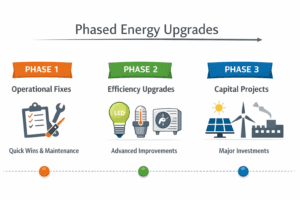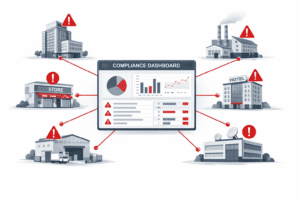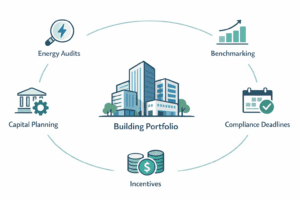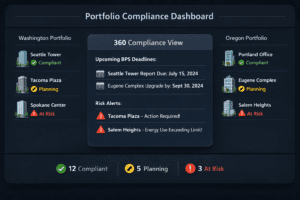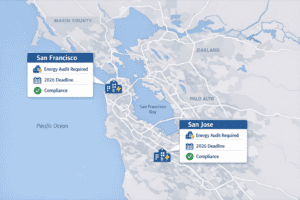Boulder’s Building Performance Standards (BPS) requires commercial property owners to meet strict energy efficiency rules by 2025. Non-compliance carries daily fines and potential legal risks.
To help ensure your compliance we created this guide to walk you through Boulder’s 2025 BPS requirements, outline the audit compliance process, and give you a simple checklist to make sure you’re ready.
What Are the Boulder Building Performance Standards for 2025?
If your building is big, Boulder expects big changes (and the deadline to get compliant is closer than you think). It’s not optional.
Boulder BPS was designed to cut energy use and emissions in the city’s largest commercial properties. Compliance is enforced, and the fines are steep for those who miss the deadline.
If you own or manage a commercial property in Boulder that is over 50,000 square feet, here’s what the 2025 law requires:
- Complete an ASHRAE Level II energy audit
- Submit audit findings to the city before June 1, 2025
- Hire a qualified, city-approved auditor
- Ensure all building systems are evaluated (HVAC, lighting, envelope, etc.)
Avoid BPS penalties in Boulder by acting early. Waiting will cost you $150/day or more in non-compliance fines.
The Boulder BPS Compliance Checklist
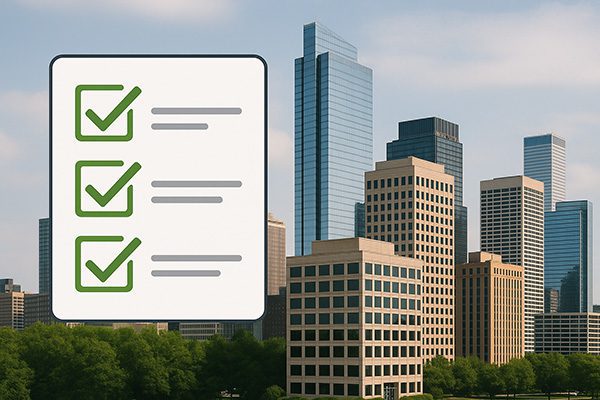
Staying compliant doesn’t have to be confusing. This checklist shows you exactly what to do, step by step.
Many commercial property teams aren’t sure where to start. This checklist breaks it down into simple steps. If your building is subject to the 2025 BPS rules, this is what you need to do in order to stay compliant and avoid costly penalties.
Step-by-step to compliance:
1: Confirm Your Building Is Subject to the 2025 Rule
- Before anything else, verify if your building qualifies under the law.
- Is your property over 50,000 ft²?
- Is it commercial or mixed-use?
2: Book an ASHRAE Level II Audit
Qualified audit providers in Boulder are already booking into next year. Visit the link below to avoid the audit rush and ensure you get a reputable firm.
- Use a Boulder-approved vendor
- Schedule well before spring to avoid rush fees
3: Prep Building Data
Your auditor will need building data to conduct a full assessment. Start gathering this now so there’s no delay.
- Historical utility usage
- Equipment inventories
- Operating schedules
4: Review Findings with Auditor
Once the audit is complete, your next step is to sit down with the auditor and review the findings together.
- Prioritize cost-effective upgrades
- Document required improvements
5: Submit Report to the City
This is the final and most important step. Make sure your submission is complete and accurate.
- Deadline: June 1, 2025
- Ensure all data is complete and accurate
Why Act Now? Boulder Audit Providers Are Booking Fast
The closer we get to Q2 2025, the fewer auditors will be available. If you wait until spring, you risk not only higher prices but potentially missing the deadline entirely.
What early action gets you:
- Lower costs: Avoid rush premiums and last-minute contractor surcharges
- Better planning: Time to review findings and plan upgrades
- Avoiding fines: Every day past the deadline costs money
Audit requirements for buildings over 50,000 ft² in Boulder are not flexible. Act now to secure your place.
Choosing the Right Energy Audit Partner
The right audit partner won’t just save you time, they’ll help you stay out of legal trouble. Picking the wrong audit partner can set your project back weeks and jeopardize your compliance. You want someone who knows Boulder’s laws inside and out and has delivered compliant audits before.
Here’s what to look for in an audit partner:
- Experience with Boulder BPS audit compliance 2025
- Knowledge of the Boulder Building Performance Standards 2025 rules
- Certified to perform ASHRAE Level II audits
- Transparent process and timeline
- Willingness to handle submission and city communication
Ask them for examples of past audits, documentation templates, and timelines. The best firms will have this ready to go.
What Happens If You Miss the Deadline?

Miss the deadline, and you’re not just paying fines, you’re putting your building’s reputation and value at risk. Some property owners assume they can apply for an extension or pay a one-time fine. That’s not how it works in Boulder.
Here’s what non-compliance looks like:
- $150+/day in fines that stack fast
- Public disclosure of non-compliance
- Strained tenant relationships
- Complications with insurance or refinancing
Cities across the country are integrating performance rules into broader ESG scoring. This isn’t just about the environment anymore, it’s about your building’s marketability and long-term value.
Summary: Boulder BPS Filing Process 2025
You don’t need to become an expert in building science. But you do need to follow these 5 steps:
- Confirm your building is subject to the rule
- Schedule a qualified audit before Q2 2025
- Prepare your building’s data for analysis
- Complete and review the audit
- Submit your report by June 1, 2025
Failure to act in time means escalating daily fines and operational risk.
Prefer to completely avoid BPS penalties in Boulder? See how fast and easy you can get compliant using our Instant Audit Tool



